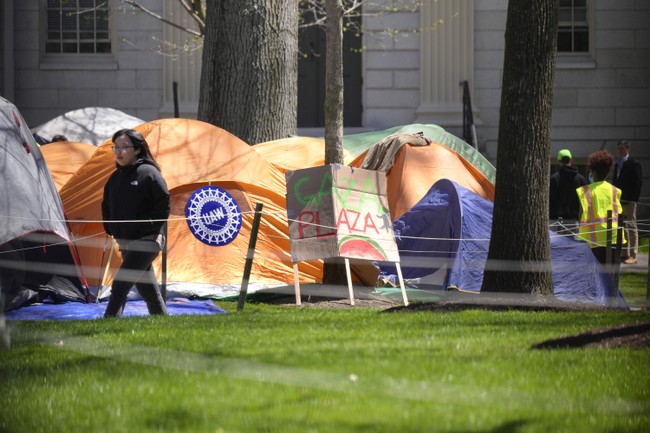
Secret weapon? Thus far, the Trump administration has deployed plenty of public weapons in the fight to end anti-Semitism and illegal discrimination in Academia, and especially in the Poison Ivies. The most obvious weapon has been money, and that was enough to get Columbia’s attention, if not its full cooperation.
For Harvard, Donald Trump and his team have also deployed tax exemptions and access to foreign students and funds — again, publicly. In fact, as the Wall Street Journal reports this morning, the administration got surprised and infuriated by how public Harvard made it, and now may up the ante:
The Trump administration has grown so furious with Harvard University after a week of escalating dispute between the two sides that it is planning to pull an additional $1 billion of the school’s funding for health research, according to people familiar with the matter.
Trump administration officials, the people said, thought the long list of demands they sent Harvard last Friday was a confidential starting point for negotiations.
They were surprised on Monday when Harvard released the letter to the public. Before Monday, the administration was planning to treat Harvard more leniently than Columbia University, but now officials want to apply even more pressure to the nation’s most prominent university, according to the people.
People familiar with Harvard’s response say that there was no agreement to keep the letter private, and that its contents—including requirements that Harvard allow federal-government oversight of admissions, hiring and the ideology of students and staff—were a nonstarter.
Worth noting: the letter apparently did not have any indications for confidentiality. Perhaps the administration simply assumed that Harvard would prefer to keep the terms quiet. That would not have been an unreasonable assessment, although it would have been impossible to keep the eventual terms of an agreement quiet in the long run. Either the terms offered offended Harvard so much that it opted to go to war with Trump instead, or they never intended to negotiate in good faith past some window-dressing changes that Haravrd had already implemented.
The administration has concluded that the latter scenario is the correct one. That is why the Trump team has gone all-out in its response for the past week, raising the issues of Harvard’s tax exemption and access to foreign students. The Department of Education resurrected a first-term probe into Harvard’s compliance on requirements for reporting foreign income too, which outside groups say have been rife with violations and underreporting.
Again, those have been public steps toward forcing Harvard into compliance with federal civil-rights laws. They have another weapon in their legal armament, however, which could turn very destructive for Academia, including Harvard, as litigator Louis Bonham explained at Legal Insurrection yesterday. The False Claims Act (FCA) could turn into a revenue bonanza for Trump and a fiscal disaster for schools that refuse to rid themselves of discriminatory policies, no matter what label they apply to them:
The False Claims Act (31 U.S.C. § 3730; the “FCA”) was passed over 150 years ago to address a seemingly intractable problem: widespread fraud by defense contractors during the Civil War. Under the FCA, a person who knowingly submits a false claim to the government is liable for three times the government’s damages plus additional penalties. For example, a hospital that knowingly obtains $10 million from the federal government on bogus Medicare invoices would be liable to the government for over $30 million.
But while the government can bring such claims itself, the FCA has another important component: the ability for whistleblowers (i.e., people with inside information of the fraud) to bring FCA suits in the government’s name, and receive a reward of up to 30% the funds recovered. Such private prosecutions are known as qui tam actions, and the vast majority of the billions recovered annually under the FCA arise from them.
What does that have to do with colleges and universities? Plenty, Bonham explains, especially in the private legal action arena:
Through a recent “Dear Colleague” letter, the Trump administration has warned schools that any programs or practices that favor or disfavor anyone based on race, color, ethnicity, national origin, etc. are illegal under federal law, and thus the annual nondiscrimination certifications require the school to aver that they do not have any such programs or practices.
But faced with the choice of foregoing federal funds (which would be fiscally impossible for most schools) and ending DEI programs (which the school may view as a moral imperative, regardless of their illegality), most schools will likely choose door number 3: they will falsely certify that they do not have discriminatory programs or practices, but will continue them sub rosa. This is the same attitude evidenced by UC Berkeley law school Dean Erwin Chemerinski’s admission (on video) that notwithstanding the Supreme Court’s SFFA decision, his school continues to engage in “unstated affirmative action,” but that “if ever I’m deposed I’m going to deny I said this to you.”
Were a school to submit such false certifications, and thereafter receive its annual haul of federal funds (including federally guaranteed loans to its students – loans that would not have been made but for the nondiscrimination certification), then it has violated the FCA, and could be required to repay over three times the funds the federal government provided based on the fraudulent nondiscrimination certification.
Potential plaintiffs could have already filed such FCA actions after SFFA, Bonham explains. That would have been an especially potent weapon against schools that have eliminated DEI labels while retaining the same discriminatory policies, usually under the new label of “belonging.” However, during the Biden administration, no such “Dear Colleague” warning letter got issued about the interpretation of SFFA to schools, and the DoJ would likely have intervened to get any FCA lawsuits dismissed.
Now, though, the field appears to be open for FCA actions over discriminatory policies and actions at Harvard and elsewhere. Needless to say, losing federal funding is bad enough, but paying treble damages for DEI practices and policies would cut even more deeply and might force schools to start draining out their endowments to cover those judgments. Bonham offers some speculative math on the subject, and let’s just say that litigators may already be preparing for paydays, even absent open encouragement from the Trump administration.
Of course, Harvard and other academic institutions have an option. They can dump DEI altogether, embrace merit in hiring and admissions, allow for viewpoint diversity instead, and stop anti-Semites from conducting intimidation campaigns on their campuses. Had these institutions acted responsibly in the first place, this fight would not have taken place.







